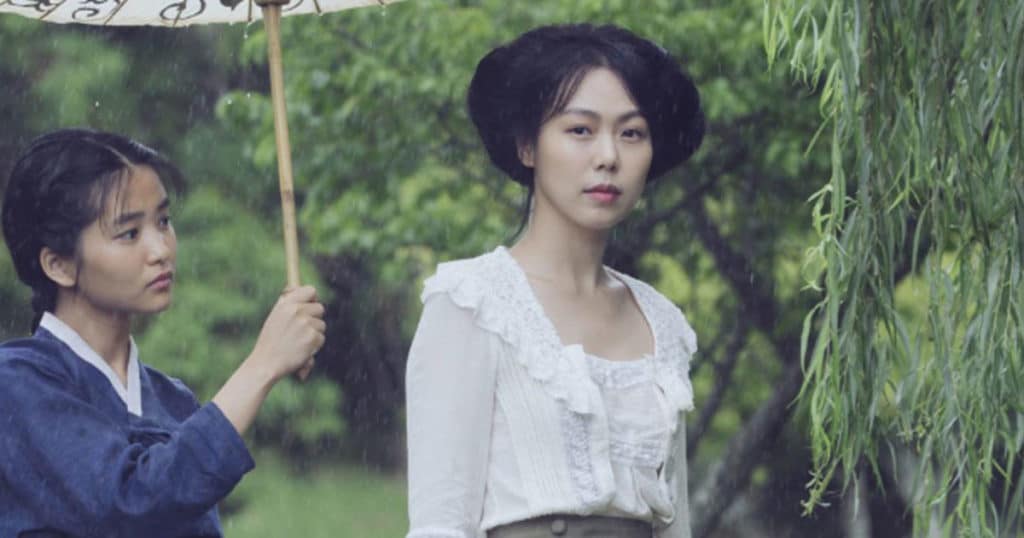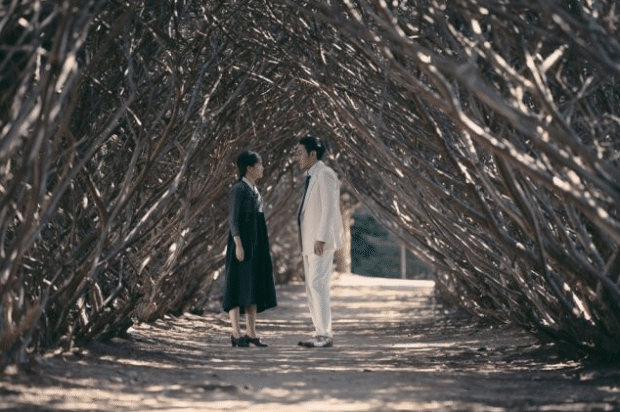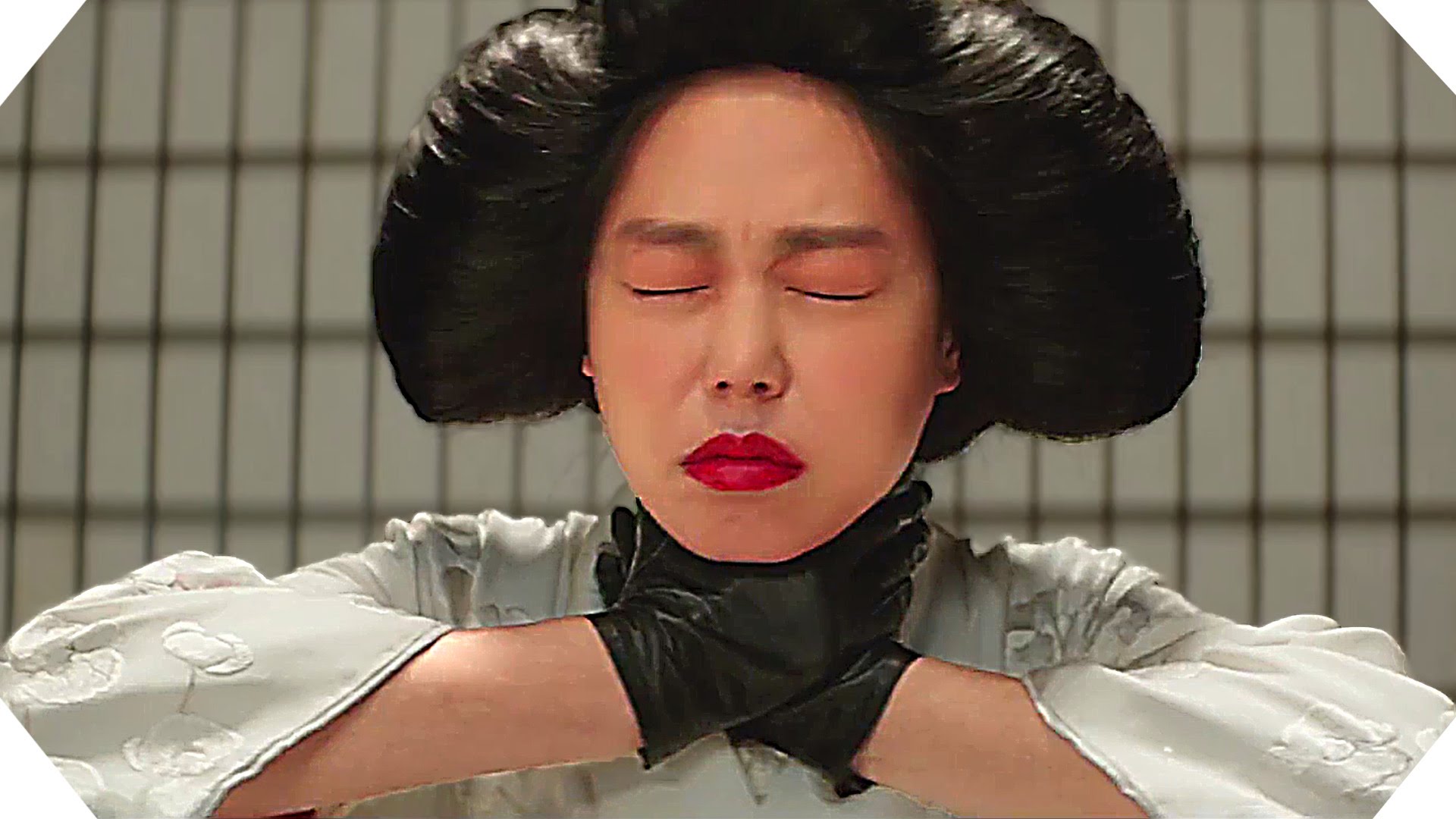Whilst it’s over ten years since director Park Chan-wook began stepping back from the beautiful, but brutal revenge sagas which first brought him to our attention, it’s nonetheless fair to say that I was surprised by The Handmaiden, his most recent feature. Although in some ways you can see commonality – deceptive appearances, surveillance, sexuality – between this and his earlier works, it’s otherwise a very different beast, a period drama which makes us look and look again at what we are being told before we can really understand its story. However, Park allows himself one minor tentacles/torture set piece. It’s only fair; they’ve done him proud up until now.
 The film is set in 1930s Korea: while Europe was grappling with the rising possibility of another war with Germany, the Japanese had already extended their empire to include China and Korea, occupying the latter from 1910. A young Korean girl, Okju, is told that she’s been selected for the role of handmaiden – or a lady’s maid – for a wealthy Japanese heiress, Hideko, who lives with her uncle at a grand Korean mansion. Okju – going by the Japanese name of Tamako for her new role – is both spellbound and intimidated by the place, a weird mish-mash of Japanese and Western architecture, and at first can only gather scraps of information on her new mistress, who is apparently much-afflicted with her nerves. Tamako’s first meeting with her is after Hideko has a violent nightmare, but the new maid can’t help but be warm and informal with her from the outset, doing her best to calm her. Thus, a peculiar friendship is born.
The film is set in 1930s Korea: while Europe was grappling with the rising possibility of another war with Germany, the Japanese had already extended their empire to include China and Korea, occupying the latter from 1910. A young Korean girl, Okju, is told that she’s been selected for the role of handmaiden – or a lady’s maid – for a wealthy Japanese heiress, Hideko, who lives with her uncle at a grand Korean mansion. Okju – going by the Japanese name of Tamako for her new role – is both spellbound and intimidated by the place, a weird mish-mash of Japanese and Western architecture, and at first can only gather scraps of information on her new mistress, who is apparently much-afflicted with her nerves. Tamako’s first meeting with her is after Hideko has a violent nightmare, but the new maid can’t help but be warm and informal with her from the outset, doing her best to calm her. Thus, a peculiar friendship is born.
But it turns out that Tamako isn’t as innocent as all that. She’s not Okju, or Tamako, but Nam-Sookee, a likeable little rogue from Korean criminal stock: her mother was hanged for being a thief, and her network of aunties, cousins and young charges keep company with some very crooked people indeed. Amongst these are fellow con-artist ‘Count Fujiwara’, a Japanese nobleman who is really neither of those things, but wants to get close to the wealthy Hideko, so that he can marry her and secure her fortune for himself. Getting insider knowledge from the lady’s maid is all part of this scheme, but he promises Sookee a cut of the profits when he’s done and he has, as he puts it, dumped Hideko in a madhouse. Everyone, it seems, has their price and Sookee has her own ambitions to get far away from her current situation, so she agrees to this set-up.
The thing is, she’s unprepared for the melancholy and enigmatic Hideko, whose beauty charms her, while she’s troubled by the bizarre relationship Hideko has with her elderly uncle, a bookseller and collector who uses her to perform readings for his invariably male buyers and guests (spoiler: he doesn’t ask her to read The Famous Five to them). Likewise, Hideko is intrigued by this lively new maid who speaks her mind and seems oddly earnest. Gradually their relationship changes, though the extent of these changes is steered in surprising directions. A long film in three separate chapters, Park allows different voices to come to the fore as he – gradually – reveals the truth. Some scenes are repeated and extended as other characters assert how things actually happened, telling us their version of events. The overall effect is very immersive.
“What does a crook know about love?”
Although the way is never left clear, the film really shines as an examination of the redemptive power of the two girls’ relationship, something which blossoms on screen. Park takes his time with this story; nothing is rushed. Sex is a key factor in this – throughout, even the intimation of sex with men is coarse and sadistic, whereas with women it’s gentle and intimate – but minor scenes work just as well. For example, where Hideko laces her maid into a tight corset, so that they each mirror the other (there’s a great deal of this mirroring elsewhere) they can speak to each other as equals for a short time, which encourages each of them to relax their guard a little. These moments of breakthrough eventually guide the two girls to their later actions. Essentially, the machinations of others bring them together, and it’s these little moments of parity which help their relationship to move beyond the strictures imposed on it by other forces – those which underestimate and belittle them. It’s this error of underestimation which is turned to such brilliant effect in the third chapter, something definitely worth waiting for.
 The Handmaiden is also a beautiful piece of film, where every fragment of every scene looks sublime. From the characters themselves – I’m sure Min-hee Kim is carved out of marble – to their clothing, to the interior shots and the landscapes, it looks as though some kind of mathematical formula has been used to perfectly compose every moment. Even someone eating a grain of rice turns into a vision. And if you think I’m exaggerating, well – you need to see it, then you’ll believe it.
The Handmaiden is also a beautiful piece of film, where every fragment of every scene looks sublime. From the characters themselves – I’m sure Min-hee Kim is carved out of marble – to their clothing, to the interior shots and the landscapes, it looks as though some kind of mathematical formula has been used to perfectly compose every moment. Even someone eating a grain of rice turns into a vision. And if you think I’m exaggerating, well – you need to see it, then you’ll believe it.
A film which unveils new ways in which its characters understand the world is always the product of a skilled hand, and Park Chan-wook certainly fits that bill. Whilst links to horror are for the most part subtly unfolded here, all neat aesthetic twists and stock-in-trade unhappy heroines, the film still has an ugly underbelly of vice and criminality. It’s the threat of these forces winning out which really drives the story, but also allows the story to expand as sumptuously as it does. This is another phenomenal and challenging piece of work.
The Handmaiden will be released on Standard and Special Edition DVD/Blu-Ray by Curzon Artificial Eye on 7th August.
